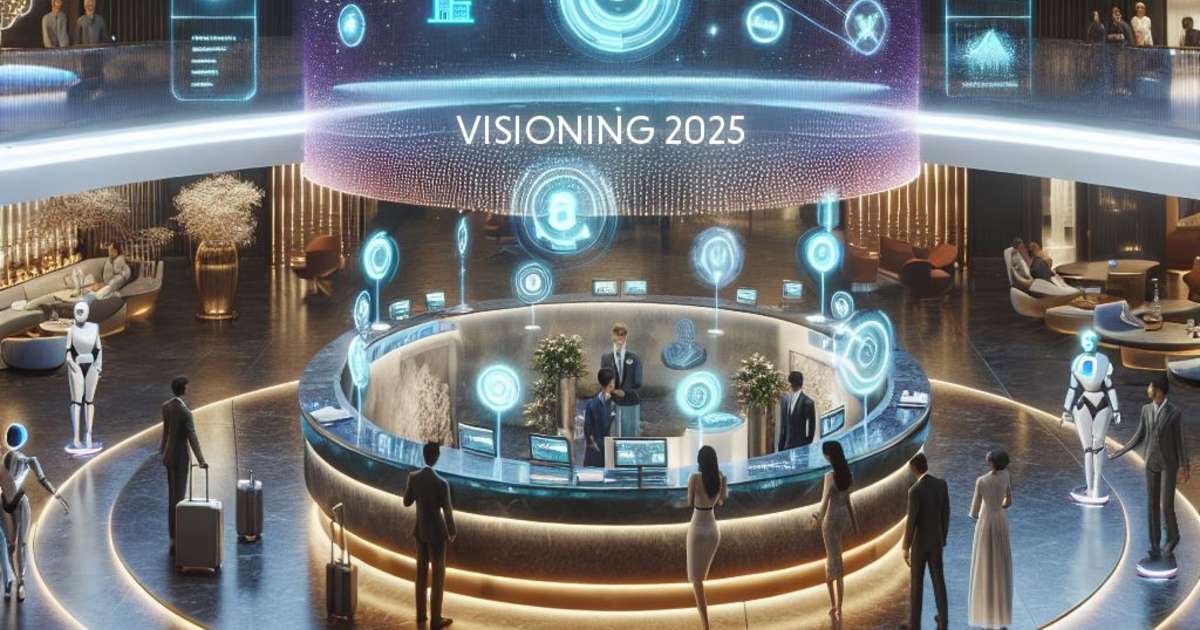
As we approach 2025, the hospitality sector is gearing up for a tech-based transformation. Several key trends and developments are expected to revolutionise the industry, empowering businesses to remain competitive, streamline operations, and enhance guest experiences.
- The multifaceted capabilities of AI
Artificial Intelligence (AI) will take centre stage in transforming how hotels engage with their guests. Sophisticated AI-powered tools and technologies will be able to anticipate guests’ needs based on previous stays, preferences, and data collected from various interactions. Expect customised room arrangements, specialised activity recommendations, and flexible pricing strategies to become more mainstream, making each guest feel uniquely valued. This year, the industry will see the use of AI for diverse purposes, including decision support, assisting employees, training and upskilling of employees. Responsible AI, which works within the framework of cybersecurity and personal data protection would be introduced too, ensuring that technologies are deployed ethically, securely, and in compliance with privacy standards.
- Cybersecurity and guest data protection
According to RH-ISAC’s annual Holiday Season Cyber Threat Trends report, social engineering, ransomware, and Scattered Spider activity are likely to remain key threats to the industry in 2025. With hospitality’s growing reliance on digital systems and online transactions, these threats are likely to continue. To protect sensitive guest data and prevent cyber threats, more hotels will leverage cybersecurity measures, including advanced encryption, multi-factor authentication, and AI-driven security systems that can detect and neutralise potential threats in real time. Building trust in AI applications would be a key initiative this year as well; AI systems that are transparent, accountable, and ethically deployed will foster greater confidence among customers and stakeholders.
- The rise of integrated hotel management platforms
78% of hoteliers will increase their investment in hotel technology in the next three years, according to research by Duetto. There is a major shift towards fully integrated hotel management systems on the horizon, also accelerated by cloud technology adoption. These comprehensive platforms are set to centralise key operations, including booking, guest services, housekeeping, and revenue management. By consolidating data and tools in one place, hoteliers can reduce manual processes, minimise errors, and boost efficiency, promising a seamless guest experience. Clean and meaningful data will provide the platform for AI adoption, enabling hotels to leverage advanced analytics and predictive insights, optimising decision-making, enhancing efficiency, and offering tailored recommendations.
- Tech adaptation for staff training
Despite technology not being able to replicate the human touch that is essential in hospitality, it will certainly help in bridging the gaps in staff requirements. Mobile-first self-learning solutions, particularly in the context of hospitality, are designed to support staff in upskilling and adapting to new technologies, making them an essential part of tackling staffing shortages. These solutions often offer resources that can be accessed easily from mobile devices, enabling employees to learn on the go. For instance, AI-powered mobile platforms guide staff through tasks, helping them troubleshoot issues, manage requests, and stay up to date on company protocols. Consequently, these solutions contribute to alleviating staff shortages by improving operational efficiency, reducing the time spent on training, and allowing employees to take on a greater range of responsibilities with confidence.
- Growing focus on sustainability
Modern guests—especially younger demographics—demand more eco-conscious options, ranging from energy-efficient room features to sustainably sourced food and responsible waste management. With the demand rising, sustainability has become a key part of brand identity and strategy in the hospitality industry. Using smart thermostats and lighting to save energy, AI to reduce food waste, plastic-free policies, and digital tools like apps and kiosks, all help make accommodations, dining, and travel more eco-friendly. These efforts lower the industry’s environmental impact and support critical ESG goals, while positioning brands as responsible, forward-thinking leaders.
- Omnichannel payment options
As the digital economy continues to evolve, so will the way guests pay for their hospitality services. Omnichannel payment solutions will become the norm in 2025. Joined with advanced cybersecurity and AI fraud detection, these options will offer access to a range of payment methods while also ensuring maximum security. Whether guests are booking a room via a mobile app, paying for services at the front desk, or ordering food through an online ordering system, payment methods will be integrated across all touchpoints. Digital payment options, such as contactless payments, digital wallets, cryptocurrencies, and buy-now-pay-later (BNPL) options, are set to maximise the ease and convenience for guests.
- The surge of wellness travel
The wellness travel trend is gaining momentum with an increased demand for holistic wellness experiences that promote physical, mental, and spiritual well-being. Guests are seeking integrated wellness experiences that go beyond traditional fitness activities and spa treatments. Hotels and resorts will cater to that via personalised wellness plans that incorporate fitness classes, spa treatments, meditation and yoga sessions, and healthy menu options tailored to individual needs. In-room wellness amenities will also become more advanced, with features such as mood lighting, air purifiers, and sleep-enhancing technologies. In the coming year, the industry can expect a surge of wellness ERP utilisation to manage the growing demand as well.
Heralding a new era in hospitality
The hospitality industry is entering a new era, driven by advancements such as artificial intelligence and other transformative innovations. The industry is heralding an era of extraordinary guest experiences, where the seamless collaboration between human expertise and digital intelligence creates unparalleled service.
About IDS Next
Founded in 1987, IDS Next became India’s largest hotel software company in its first decade of operations and Asia’s largest in 2009.
Today, IDS Next is the leading provider of smart hotel software across Southeast Asia, the Indian Ocean, the Middle East, Africa, and Oceania, serving over 6,000 customers in 45 countries with $10 million in daily transactions and 300,000 daily check-ins.
With the goal to redefine the way hotels operate through smart software solutions, IDS Next has been a trusted technology partner and preferred supplier to the international hospitality industry.
From contactless check-in, front desk, guest request and housekeeping management to payroll, finance, inventory management and procurement, IDS Next’s award-winning software automates and streamlines front and back-office hotel operations, making sure all departments are covered.
With an open API approach, IDS Next integrates with over 100 of the world’s leading, best-in-breed technology partners to ensure hotel operations run smoothly and securely to complement a hotel’s existing systems and solutions.
Available in single modules and as an all-in-one solution, IDS Next’s smart hotel software is designed by hoteliers for hoteliers through the company’s in-house development team comprising 135 hospitality technology professionals and supported 24/7 by 90 customer services agents in 30 languages.
With all software PA DSS certified, front-of-house solutions GDPR compliant, and the business ISO 27001 certified, IDS Next’s smart software solutions are accredited, certified, and compliant with the industry’s most stringent standards for data protection and security.









